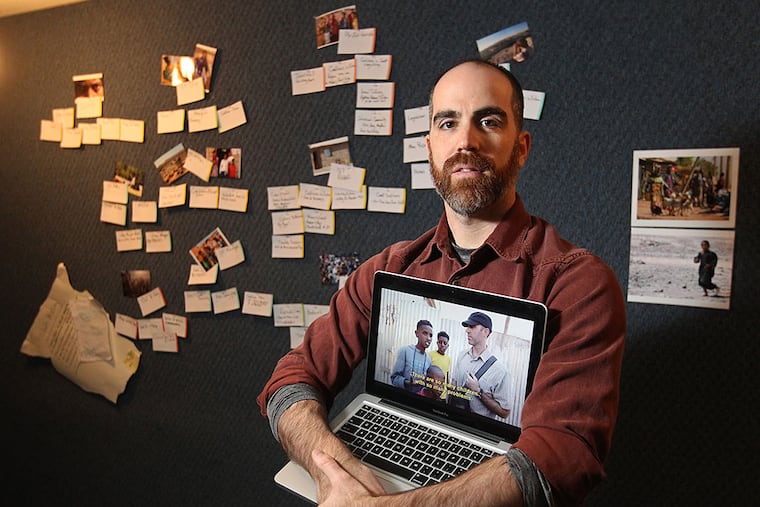West Chester filmmaker driven to tell Eritreans' story
When a refugee working to oppose one of the world's most repressive regimes tried to leave, the Eritrean government found him and held him in an underground prison for six years until he escaped.

When a refugee working to oppose one of the world's most repressive regimes tried to leave, the Eritrean government found him and held him in an underground prison for six years until he escaped.
His job at the jail had been to sell the kerosene that inmates buy for cooking. He said he saw some use it to set themselves on fire.
"That was one of the first stories we heard," said Chris Cotter, an aspiring filmmaker in West Chester. "It was tough."
Cotter, a 37-year-old musician, is almost done making a documentary - Refugee: The Eritrean Exodus - to share people's stories and raise awareness about human rights abuses in Eritrea, a country slightly larger than Pennsylvania on the Horn of Africa.
Cotter has climbed Mount Kilimanjaro in Tanzania and traveled in Europe, South America, and Kenya. But until two years ago, he had never heard of Eritrea.
He learned about the regime from a friend's father. A refugee group had contacted the man and he knew Cotter wanted to work on a humanitarian project abroad.
"I wanted to do something more important than just passing through," Cotter said.
He started his production company, Tailor Made Media, in 2011 and operates it from a back room on the third floor of Taylor's Music Store & Studios in West Chester. That's also where he teaches children to play drums and where his experimental rock band, WaveRadio, records.
Cotter said he has worked on TV pilots, corporate training videos, and a children's musical, It's Not Mean to Be Green, about being environmentally friendly. But he has never made a full-length film.
"We're just a little production company," he said. "This is greater than anything I thought I would ever do."
Cotter's five-person team includes Joe Acchione, 28, co-owner of his production company; and Scott Miller, 25.
The U.S. State Department has warned Americans not to travel to Eritrea, citing, among other things, armed citizen militias, crime, detentions, and "harsh" prison conditions. A U.N. commission is investigating reports of human rights abuses there.
The Eritrean Embassy has said allegations against its government were "malicious distortions."
Cotter and Miller, who lives in Downingtown, left in 2013 for Ethiopia, Eritrea's southern neighbor, and then went to Israel, where tens of thousands of Eritrean asylum-seekers have fled.
"It was pretty daunting, because we had no idea what to expect," Miller said.
For two weeks, they talked to Eritrean refugees who have joined government officials and a soccer team in fleeing since Eritrea's 1993 independence from Ethiopia.
"They'd never had anyone to hear their story," Cotter said. "What they had gone through was really heart-wrenching."
He heard stories of people who said the Eritrean government held them for ransom. They said the regime tells border agents to shoot people trying to flee.
Fear of the government follows those who leave.
Cotter also said he talked to children in refugee camps who had escaped Eritrea on their own. They were the same age as his music students.
Some refugees escape to Sudan, Saudi Arabia, Syria, Somalia, or Iraq. Many have died trying to make their way to Europe.
John Stauffer, who cofounded a nonprofit in 2010 to aid Eritreans and who helped Cotter with the documentary, said they know the documentary probably will not change the regime in Eritrea.
They hope the film, which Cotter plans to show locally and globally, spurs countries to help.
"When you have individuals speaking to you, so to speak, about what they're enduring, it's very compelling," said Stauffer, head of the America Team for Displaced Eritreans.
Solomon Sengal, 54, an Eritrean who grew up in Ethiopia, said he was counting on the film to touch hearts worldwide.
"Most people are compassionate, humanitarian," said Sengal, now a U.S. citizen in Virginia. "They're the ones that would force their politicians to act in a positive way."
Most people in the refugee camps in Ethiopia were too afraid to talk on camera. Cotter blurred many faces in the film.
He said he hoped to finish the documentary by spring. He is almost done editing down dozens of interviews and more than 50 hours of footage.
Family and friends have helped finance his work. He also started an online fund-raiser on Kickstarter last month.
He has a few thousand dollars left to raise to meet his $30,000 goal before the fund-raiser ends Wednesday.
"It's important to get the film out as soon as possible," he said. "Every day we don't have the film out is another day someone suffers and dies."